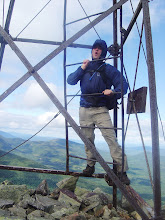 The 100th running of the Boston Marathon, 1996
The 100th running of the Boston Marathon, 1996The Boston Marathon is an annual marathon sporting event hosted by the city of Boston, Massachusetts, on Patriots' Day, the third Monday of April. Begun in 1897 and inspired by the success of the first modern-day marathon competition in the 1896 Summer Olympics, the Boston Marathon is the world's oldest annual marathon and ranks as one of the world's most prestigious road racing events.
Today, the Boston Athletic Association (B.A.A.) manages this event. Amateur and professional runners from all over the world compete in the Boston Marathon each year, braving the hilly New England terrain and unpredictable, sometimes brutal, weather to take part in the race.
Qualifying times for the Boston Marathon vary by the prospective participant's sex and age group. The marathon is one of five members of the World Marathon Majors.
The event attracts an average of about 20,000 registered participants each year. In the 100th running of the Boston Marathon in 1996, the number of participants reached 38,000. While there are cash prizes awarded to the winners of the marathon, most of the runners take part in the historical marathon just for the joy of participating in such a prestigious race. Indeed, the qualifying standard is high enough that many marathoners aspire to meet it, and doing so is considered an achievement in itself.
Boston Marathon's Monday race date is unique to the sporting calendar of the major marathons. The race has traditionally been held on Patriots' Day, and until 1969 that was every April 19, whichever day of the week that fell on. Starting in 1969, the holiday was observed on the third Monday in April, and so the marathon date was correspondingly fixed to that Monday.
The Boston Marathon is New England's most widely viewed sporting event. About 500,000 spectators watch the race live annually, and more than 1,100 media members from over 250 outlets were expected to receive media credentials in 2006. Current course records as of 2007 are 2:07:14 and 2:20:43 for men's open and women's open, respectively.
History
 Boston Marathon Finish Line, 1910
Boston Marathon Finish Line, 1910The Boston Marathon was originally a local event, but its fame and status have attracted runners from all over the world. In recent years, critics of America's professional sports leagues have pointed to the dominance of foreign-born athletes in the event (especially runners from Kenya) to back their arguments that American professional running is lagging behind the rest of the world in terms of producing quality athletes. However, foreign dominance of the race is nothing new. Between 1946 and 1967 only one American (John J. Kelley in 1957) won the marathon in an era when Finland and Japan were the distance powerhouses.
For most of its history, the Boston Marathon was a free event, and the only prize awarded for winning the race was a wreath woven from olive branches. However, corporate-sponsored cash prizes began to be awarded in the 1980s, when professional athletes began to refuse to run the race without cash awards. The first cash prize for winning the marathon was awarded in 1986.
Women were not allowed to enter the Boston Marathon officially until 1972. Roberta (Bobbi) Gibb is recognized as the first woman to run the entire Boston Marathon (in 1966). In 1967, Kathrine Switzer, who had registered as "K. V. Switzer", was the first woman to run with a race number. She finished, despite a celebrated incident in which race official Jock Semple tried to rip off her numbers and eject her from the race.[6] In 1996 the B.A.A. retroactively recognized as champions the unofficial women's leaders of 1966 through 1971.
Source: Wikipedia

No comments:
Post a Comment